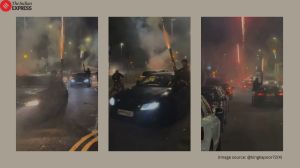PM on front page, his adviser on backfoot
NEW DELHI, JANUARY 3: It was meant to be an ‘‘exclusive’’ to o...

NEW DELHI, JANUARY 3: It was meant to be an ‘‘exclusive’’ to one paper in the north which went to town with it on its front page only to find that its rival had the same ‘‘story’’ deep inside. The first part of Prime Minister Atal Behari Vajpayee’s ‘Musings From Kumarakom’ published this morning has sent his spin doctors scrambling for cover.
The moderate message, said to be penned by speechwriter Sudheendra Kulkarni, hasn’t quite become an issuethe VHP promptly said it took orders only from sadhus, neither the government nor the court. But the choice of the medium has led to several red faces in the PMO. Beginning with that of Media Advisor H K Dua himself.
Dua, who edited The Hindustan Times and fought a long legal battle with The Times of India, wasn’t pleased at all. ‘‘It was supposed to appear only in The Hindustan Times,’’ he told The Indian Express this evening. ‘‘We are inquiring how this (its publication in The Times of India) happened.’’
Whether this inquiry provokes musings of a different kindon the media’s relationship with the government of the dayis still not clear. What is clear, however, is that Vajpayee’s advisers, many of them journalists once upon a time, are divided. While some point to the US, claiming that presidents have written for American papers, others are critical in private.
They argue that national broadcaster Doordarshan would have been the right choice given that, unfortunately, there are still some people in this country who can’t read newspapers. Or that the text should have been made public for the entire media to use, in whatever way each wanted.
Dua’s explanation is that the PM wished to put his views on record in writingand in his own words. ‘‘As he himself says in his article, these were his musings while on holiday,’’ Dua said. ‘‘It was not a statement. If it had been, we would have given it to everybody.’’
Yet, the PMO clearly wanted everyone to get the message. So while it sent the entire text to 20 newspapers, saying they were identified on the basis of language and regional circulation, excerpts were fed to the five news agencies. ‘‘We didn’t want other newspapers to miss the news in the article. That’s why we gave it to the agencies. But we told them not to release the text otherwise the newspapers would have been upset,’’ Dua said.





- 01
- 02
- 03
- 04
- 05


























